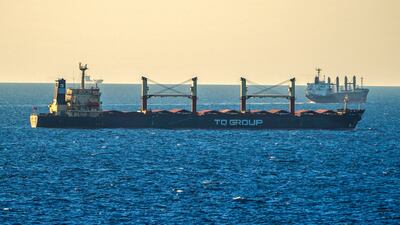A top UN official on Friday warned of “potentially catastrophic consequences” following threats made by Russia and Ukraine against civilian grain vessels in the Black Sea.
In a Security Council meeting focused on the humanitarian consequences of Russia’s exit this week from the Black Sea grain deal, UN political affairs chief Rosemary Di Carlo called for restraint to avoid the escalation of the already “dangerous” situation.
“Any risk of conflict spillover as a result of a military incident in the Black Sea, whether intentional or by accident must be avoided at all costs, as this could result in potentially catastrophic consequences to us all,” she said.
She stressed that a new wave of Russian attacks on Ukrainian ports risks would have far-reaching effects on food supplies, particularly for developing countries.
“We have now witnessed a further blow to global food security, as Russia for the fourth consecutive day struck Ukraine’s Black Sea ports in Odesa, Chornomorsk and Mykolaiv, with missiles and drones, destroying critical port infrastructure, facilities and grain supplies,” Ms Di Carlo said.
The attacks come days after Russia withdrew from a deal brokered by the UN and Turkey that allowed the secure shipment of grain through the Black Sea.
On Thursday, Russia said it would consider all ships heading for Ukrainian waters to be potentially carrying weapons and parties to the conflict.
Kyiv, meanwhile, has said that Russian vessels “may be considered by Ukraine as carrying military cargo with all the corresponding risks”.
Speaking at the Aspen Security Forum on Friday, US Secretary of State Antony Blinken said that, without the Black Sea grain deal, he did not think “it’s possible to make up the volumes lost by ending this initiative through other routes”.
“This has put a deep chill on shipping,” he said.
'Hunger is not a political tool'
UN humanitarian aid chief Martin Griffiths told the council that higher prices would be felt most acutely in developing countries, where people tend to spend a much higher share of household income on food.
Mr Griffiths said the UN would continue its engagement with all parties to ensure that Russian and Ukrainian food and fertiliser reach global markets.
According to the UN, the Black Sea grain deal had enabled the export of 33 million metric tonnes of food from Ukrainian ports to 45 countries.
The agreement also allowed the World Food Programme to transport more than 725,000 metric tonnes of wheat in support of food assistance operations in Afghanistan, Djibouti Ethiopia, Kenya, Somalia, Sudan and Yemen.
Ahead of the Security Council briefing, Britain's ambassador to the UN Barbara Woodward, who called on Russia to rejoin the deal, told reporters the world body worked “absolutely tirelessly” to address Russia's concerns.
“The point is, Russia was benefiting hugely from this deal. Russia's own food and grain exports actually significantly increased,” she said.
Olof Skoog, the EU's representative at the UN, accused Russia of concealing the gains it reaped from the surge in global food prices.
He said publicly available data demonstrates that Russian grain exports have reached record volumes.
“From July 2022 to June 2023, Russia’s wheat exports reached 44.7 million tonnes, more than 10 per cent higher than the average for previous years. Its fertiliser exports are nearing full recovery.”
Mr Skoog called on Russia to stop using food as a weapon, saying: “Food is a human right and hunger is not a political tool.”












